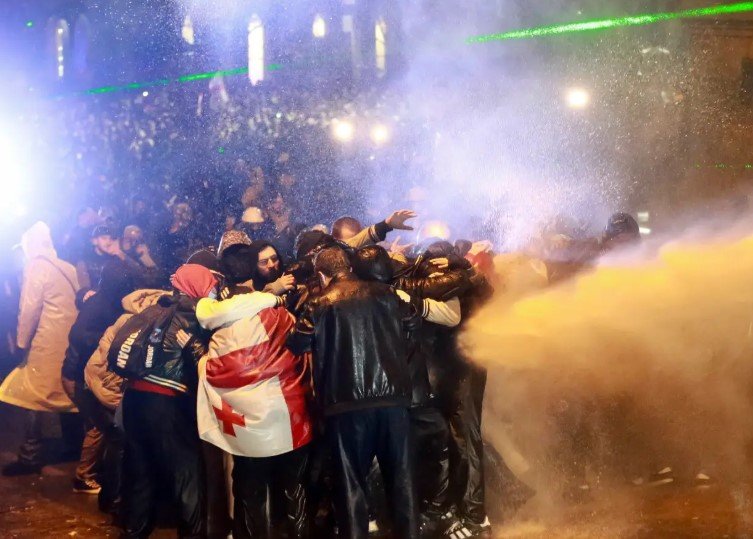Georgia is reeling from days of protests after the government suspended its bid for European Union membership. What began as peaceful demonstrations in the capital, Tbilisi, has escalated into a nationwide movement, with fiery clashes between protesters and police reflecting a country at odds with itself.
The turmoil underscores deep tensions in the South Caucasus nation, torn between its aspirations for Western integration and its complex historical ties with Russia.
Protests Spread Across the Nation
In Tbilisi, the epicenter of the unrest, thousands have gathered nightly, waving Georgian and EU flags while chanting against what they see as a pro-Russian government agenda. Protesters lit up the skies with fireworks aimed at police, who responded with water cannons and tear gas.
The unrest has rippled beyond the capital.
- Demonstrators in the central town of Khashuri hurled eggs at a Georgian Dream party office.
- Access roads to the key port city of Poti were blocked by angry protesters.
- At least eight cities reported significant demonstrations, signaling a growing national resistance to government policies.
Since the protests began, more than 100 people have been arrested, with accounts of excessive force by police causing widespread outrage. Georgia’s public ombudsman reported that 124 of the 156 arrested have alleged police violence.

President Zourabichvili Condemns Government’s Actions
President Salome Zourabichvili, who wields limited political power but serves as a pro-European figurehead, has been vocal in her criticism of the government. She described the police crackdown as reminiscent of Russian tactics and called on European nations for solidarity.
“This is not just a protest; it’s the revolt of a nation,” she said, urging the EU to provide moral and political support.
Her comments highlight a growing divide within Georgia’s leadership. The Georgian Dream party, in power since 2012, has been accused of eroding democratic norms and inching closer to Moscow, a direction many Georgians vehemently oppose.
What’s Fueling the Unrest?
Several factors have coalesced to create this volatile situation:
- Election Controversies: The October 26 parliamentary elections, denounced by the opposition as rigged, were a flashpoint.
- EU Suspension Announcement: Prime Minister Irakli Kobakhidze’s abrupt decision to halt EU accession talks until 2028 ignited protests.
- Russian Influence: Critics allege that Georgian Dream is steering the country toward Russia, raising fears of a repeat of the 2008 invasion when Russia occupied 20% of Georgia’s territory.
- Cultural Frictions: An influx of Russian nationals since the Ukraine war has unsettled many Georgians, fueling fears of cultural and political “Russification.”
A Nation at a Crossroads
Georgia’s geopolitical position has always been precarious. Sandwiched between Europe and Asia, the country has sought to align itself with Western values while navigating its historical ties with Moscow.
Yet, public sentiment strongly favors the EU. A 2023 poll by the National Democratic Institute found nearly 80% of Georgians support European integration. This latest political maneuver by the Georgian Dream government appears to undermine those aspirations, pushing the country further into internal conflict.
International Response and Fallout
The protests have drawn international attention.
- The United States has condemned the excessive use of force by police.
- EU officials have warned that Georgia’s democratic backsliding could jeopardize its long-term prospects for membership.
Even as international observers urge restraint, the Georgian government has doubled down, accusing the opposition of inciting violence to destabilize the nation.
Will the Protests Bring Change?
As unrest continues, the pressure on Georgian Dream mounts. Opposition leaders are calling for renewed elections, while public frustration simmers over the government’s decisions. Strikes, resignations by diplomats, and civil servant protests add to the growing dissent.
Whether these protests can effect meaningful change or deepen the divide remains uncertain. But one thing is clear: Georgia stands at a pivotal moment, with its future hanging in the balance.
